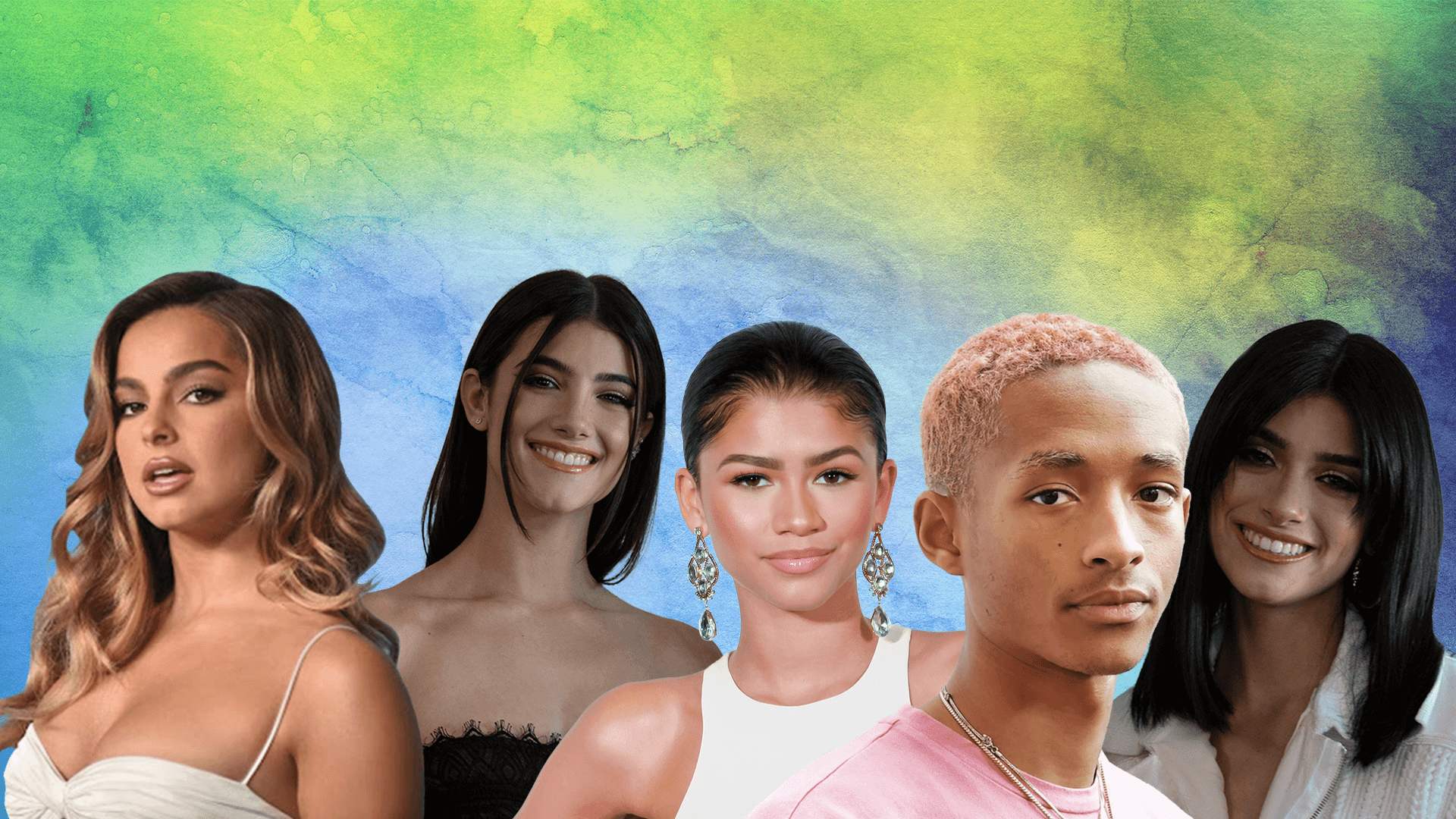From left Addison Rae and Charli D’Amelio, Zendeya at center, Jaden Smith and Dixie D’Amelio at far right
Written by Joseph Fanfan:
In today’s economy, digital influencers have an essential role in how people behave, shop, work, and make purchasing decisions. You may ask: who are digital influencers, and why are they important? A digital influencer is an individual who has built a significant social media presence and inspires the actions of their followers. Think of influencers as the popular kids in school, except they are online — mostly TikTok and Instagram. The relatability factor fosters an organic connection between everyday people and influencers. While celebrities, movie stars, and entertainers have a more substantial presence in society, the consensus among Generation Z is that their luxurious lifestyles are too far-fetched.
According to a study conducted by McKinsey and Company, people born between 1995 to 2010 are:
- True digital natives.
- They have been privy to the internet, social networks, and mobile systems since birth.
The byproduct of technology has caused Generation Z to consume information virtually and adapt to offline experiences. And due to their high internet usage, it’s easier for influencers to build organic connections with their followers, who consume from brands they have a relationship with. The causes that Gen-Z stands firm behind include mental health, body positivity, fashion trends, social issues, and sexual orientation. It is beneficial to build content around those topics to lure the influencer-centric generation.
Mental Health
Today young adults are very conscious of their mental health and prioritize it more seriously than previous generations. On Instagram, more than a million posts include the hashtag mental health (#mentalhealth), which speaks volumes to its popularity and how individuals deal worldwide. Social media users are transparent and outspoken about coping with anxiety and depression. Challenges and music that highlight the topic tend to be famous; before his untimely demise, Hip-Hop artist XXXTentacion was leading a genre of music that emphasized issues such as depression. XXXTentacion’s SAD! released in 2018, peaked at number one on the Billboard charts and is one of the most-streamed songs on Spotify with more than 1.6 billion streams and counting. The record currently stands at the 18th most streamed in Spotify’s history. Not to glorify suicide or any promotion of malicious intent, but Generation Z advocates for products that feel authentic and relatable.
Body Positivity
The appeal from supermodels who mostly wore sizes that range from zero to four reign in the early and mid-2000s; this business model led to more than 50 store closures of the famous American lingerie brand Victoria Secret in 2020. The consensus amongst younger consumers is that the brand was not realistic in terms of the images they were promoting and now conflict with their identities. In a recently published Buzzfeed article, supermodel Bella Hadid expresses the challenges she overcame while modeling for Victoria’s Secret.
“My life for so many years revolved around only working and… how I was going to lose that weight for one of those shows. Now, I just am who I am. And I don’t need to change for anybody else — even when I see things online about people talking about my body or the way it fluctuates or this or that,” she continued, attributing the change in her self-image to therapy, “self-realizations,” and “not putting my worth in anyone else’s hand except for my own.”
Hadid’s statements contribute to the consensus of Generation-Z as they are conscious of maintaining their self-images and being in control of their diet, physical and mental health.
Fashion Trends
The newer generation has always engineered fashion and style since time. However, technology has allowed youth culture to apply those synergies in virtual spaces, and the emergence of online fashion communities has become hip among younger crowds. Major fashion brands are adjusting their sales strategy to lean toward e-commerce instead of retail, which is a testament to how powerful the purchasing power of Generation Z has become. According to an independent study referenced in a Forbes article, an estimate of Generation Z’s purchasing power reached up to $143 billion, which is a number leading brands cannot afford to ignore.
Bain & Company, a global consultancy firm partnered with Depop, a fashion tech company specializing in the resale of lightly used and second-hand streetwear, collaborated on a report: how Gen Z’s empathy, awareness, and fluidity are transforming business as usual. The report offers a first-of-its-kind perspective on what motivates their financial decisions. The report analyzes qualitative and quantitative data gathered from 2,167 Depop users across the US, UK, and Australia on sustainability-related topics. The data assess four categories: empathy and awareness, self-expression, exchange and interconnection, and reimagining newness.
Depop’s platform applies social listening and fosters community to drive Gen-Z to engage and shop on the forum, leading to a significant acquisition from Etsy, valuing the Company at $1.6 billion. Depop’s strategy is simple: By championing self-expression, entrepreneurship, and sustainability, it won the minds and hearts of most users under the age of 24 who share a fluid approach to living life.
Sexual Orientation
According to the report mentioned above published by Bain & Company, 75 percent of Gen-Z claim their race, gender, or sexuality cannot be easily categorized. And to support this statistic, various sources on the internet recognize Gen-Z as the queerest generation ever, with one out of every six adults identifying as something other than heterosexual. In this modern era, Americans, in general, are more supportive of equal rights for people who identify as gay, lesbian, and transgender, or LGBTQ. Younger populations, including Gen Z, are more likely to identify as LGBTQ compared to older folks; as a result, brands are pivoting to be more inclusive in their brand message and advertising campaigns to best resonate with the sentiment of buyers who identify as LGBTQ.
A part of business success has always tied into appealing to society and culture at large. In the “Mad Men” era, which took place in the 1960s, advertising largely revolved around the lifestyle of white-collar professionals who worked on Madison Avenue — fur coats, pearl necklaces, Coca-Cola, the Ford Mustang, and the list goes on. Similarly, to remain successful in today’s economy, leading brands embrace Gen-Z’s stance on gay rights and sexual orientation to reassure them of inclusivity.
Social Issues
Lastly, Gen-Z is vocal about social issues that range from animal rights to discrimination. The joint report states, “Gen-Z was born into a globalized economy turbo-charged by digital platforms and has grown up in a time of great uncertainty: from eco-systemic issues like climate change and financial instability to personal issues like displacement and discrimination.” Gen-Z was born with technological advances that make information easily accessible, causing them to be more alert and advocate for their beliefs in virtual and physical spaces.
During the pandemic, Gen-Z led the charge to protest issues deeply rooted in American history. Rallies and protests abortion, gun laws, the Black Lives Matter movement, and many other matters felt their presence. Their efforts contribute to culture reengineering. Cancel culture, which is now a more significant movement, started because of conversations on Twitter where younger individuals were vocal about misogyny, racism, and many other concepts that violate their well-being.
Gen-Z’s views on social issues also affect their purchasing decisions. There are notable campaigns online against consuming goods from companies that invest in private prisons and child labor. As a result, brands and companies that benefit from Gen-Z are meticulous about their sales approach and corporate social responsibility.

